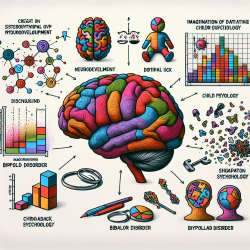Introduction
In the field of speech-language pathology, especially when working with children, the focus is often on communication and language development. However, the overall well-being of a child can significantly impact their learning and development. Recent research has explored innovative approaches to improving quality of life and managing symptoms in individuals with bipolar disorder, which may offer insights into holistic approaches that can be applied in educational settings.
The Study: Exploring Dietary Interventions
A groundbreaking study titled A randomized controlled trial to compare the effects of time-restricted eating versus Mediterranean diet on symptoms and quality of life in bipolar disorder investigated the effects of two dietary interventions: Time-Restricted Eating (TRE) and the Mediterranean Diet, on individuals with bipolar disorder (BD). The study aimed to determine which diet more effectively reduces mood symptoms and improves quality of life, particularly for those experiencing sleep or circadian rhythm disruptions.
Key Findings
The study's findings are promising and have implications for practitioners looking to incorporate holistic approaches into their practice:
- Time-Restricted Eating (TRE): Participants who followed a TRE regimen reported improvements in mood symptoms, sleep quality, and overall quality of life. TRE involves limiting eating to a specific window each day, which can help regulate circadian rhythms and improve metabolic health.
- Mediterranean Diet: Known for its heart-healthy benefits, the Mediterranean Diet also showed positive effects on mood and quality of life, although TRE was found to be more effective in certain aspects.
Implications for Practitioners
For speech-language pathologists and educators, these findings underscore the importance of considering the whole child, including their physical health and lifestyle, when designing interventions. Here are some ways practitioners can apply these insights:
- Holistic Assessment: Consider incorporating questions about diet and sleep into assessments to gain a fuller picture of a child's well-being.
- Collaboration with Families: Work with families to explore dietary and lifestyle changes that may support a child's communication and learning goals.
- Encouraging Further Research: Encourage colleagues and students to explore interdisciplinary research that examines the connections between physical health, mental health, and learning outcomes.
Conclusion
The integration of dietary interventions such as TRE and the Mediterranean Diet in managing bipolar disorder symptoms offers a new dimension in improving quality of life. As practitioners dedicated to creating positive outcomes for children, we must remain open to innovative approaches that consider the whole person. By embracing holistic practices, we can enhance our interventions and support the overall well-being of the children we serve.
To read the original research paper, please follow this link: A randomized controlled trial to compare the effects of time-restricted eating versus Mediterranean diet on symptoms and quality of life in bipolar disorder.










